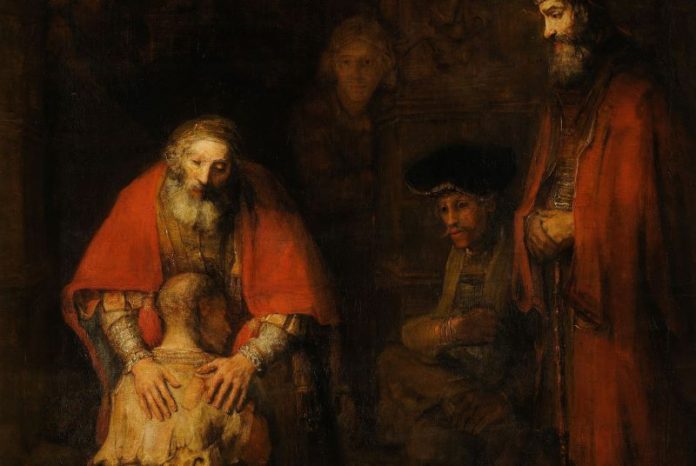
We confess because of what Jesus said.
SUSIE LLOYD
You know you’re a Catholic geek when you not only have a favorite sacrament, but you also pick the one that most people in their right mind never would: Confession. Its official name is either Penance or Penance and Reconciliation, but nobody says “I need to go to Penance” or “I hope there’s no line at Penance and Reconciliation.” Confession is its street name — and for good reason.
Everybody focuses on the process. You go somewhere private, lower your voice, and tell your sins to a priest. He could be someone you had over for dinner last month, or he could be someone you have never met. Either way, you are about to do something you WOULD NEVER DO under any other circumstance. That is why a lot of Catholics avoid confession. Meanwhile, non-Catholics simply don’t get it. Why not just tell your sins to God? He can hear you, and it would be way easier.
Good question. In the first place, we confess our sins because of what Jesus said:
“Peace be with you. As the Father has sent me, so I send you. … Receive the holy Spirit. Whose sins you forgive are forgiven them, and whose sins you retain are retained.” (John 20:21, 23)
How would the Apostles know whose sins to forgive and whose to retain (i.e., not to forgive because they are not sorry)? Not by guessing. Not by spying on people. By people telling them, of course.
Jesus authorized the Apostles to act as his agents, to absolve sinners in his name. What about the generations of sinners who would live and die after the Apostles lived and died? What then? The Apostles passed the same mission and power on to others, and then those men did to others, and on and on, in an unbroken line, down to the priests of today. Jesus made sure that no one would get left out.
Could he have done it a different way? Sure. But he did it this way on purpose. So, let’s ask: Why did he do it this way?
He wants us to humble ourselves and admit our sins to a fellow human being. God knows what our sins are, but often we do not. Everyone else knows what’s wrong with us, but we’re in denial. Isn’t the first step in fixing things in our lives admitting we have a problem?
But confession is more than just taking steps to admit our faults. It’s God meeting us there and giving us grace. Remember the Parable of the Prodigal Son (see Luke 15:11-32). The dad waited for his son every day, and when he saw him in the distance, he ran out to meet him. God is like that. You show up sorry, and he’ll do the rest. Picture his mighty fingers beaming shafts of grace straight at your hard heart, blasting away the layers of stone, making your heart soft and supple and fleshy again. “I will remove the heart of stone from your flesh and give you a heart of flesh” (Ezekiel 36:26).
And if having your sins forgiven isn’t awesome enough, get this: God forgets them.
Yes, God who knows all and sees all forgets your sins on purpose. He does not hold your sins against you. He does not throw them back in your face. Forgive and forget. We say it, but he actually does it. Who couldn’t love the sacrament of Penance?
Susie Lloyd has won three Catholic Press Awards for her writing. Find her books, articles, and speaking schedule at SusieLloyd.com.
Permission is granted to copy for use with your classes and families.
PHOTO: PUBLIC DOMAIN, Detail of THE PRODIGAL SON circa 1669, Rembrandt Van Rijn




